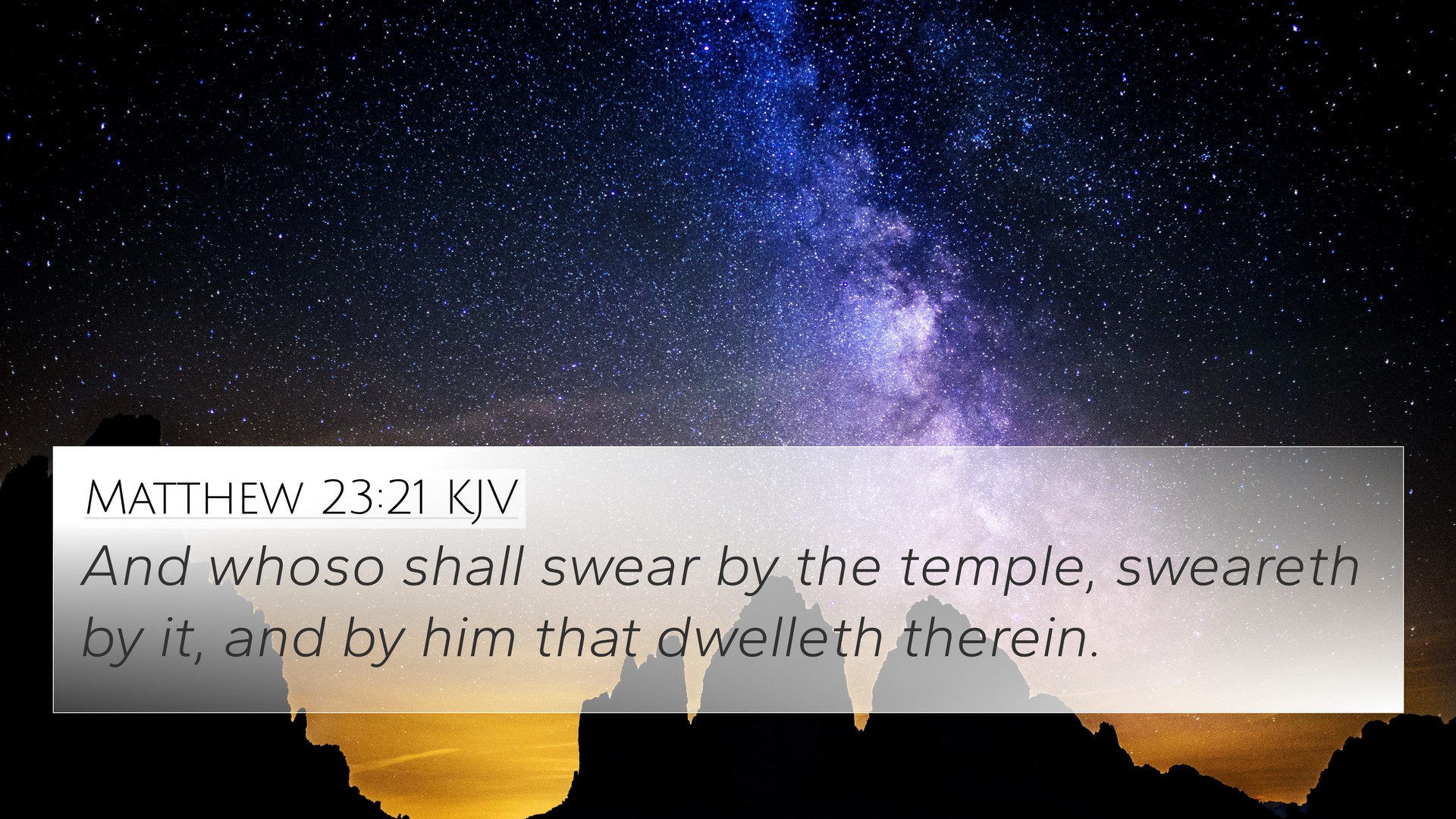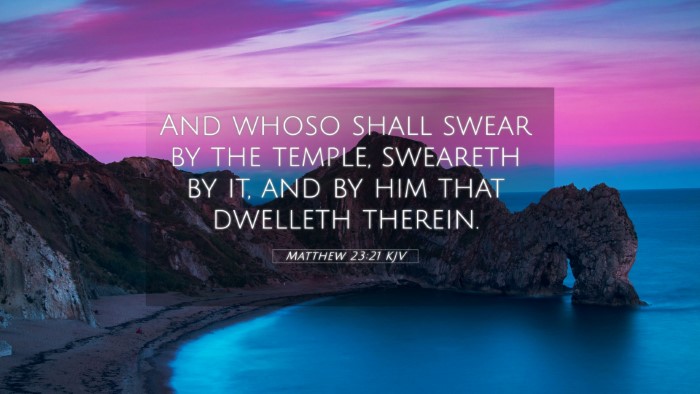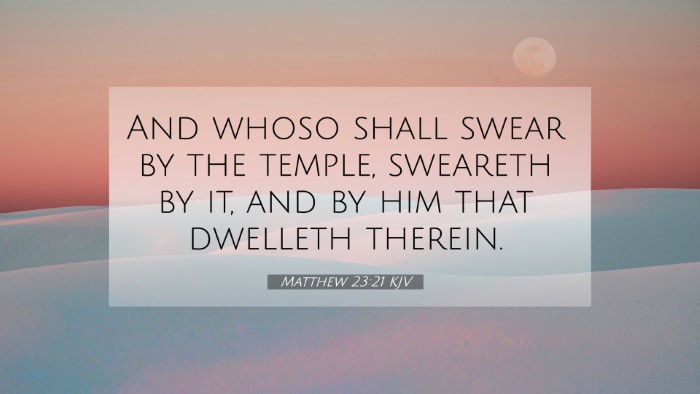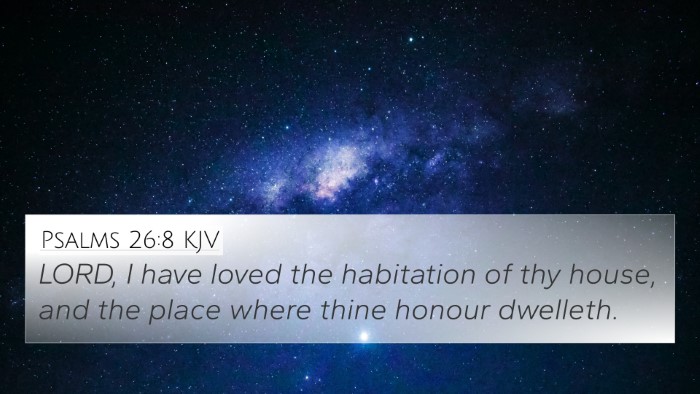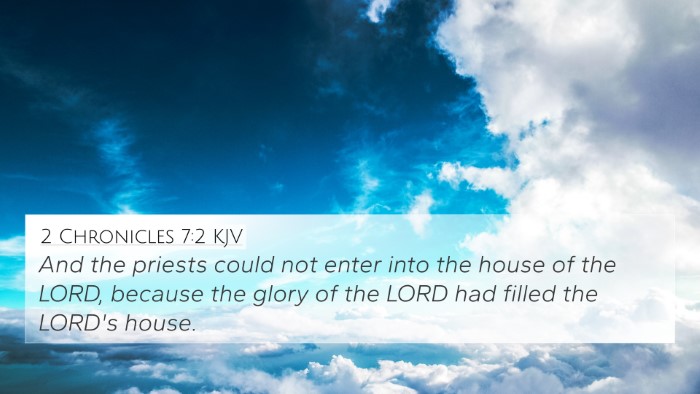Understanding Matthew 23:21
Matthew 23:21 states, "And whosoever shall swear by the temple, sweareth by it, and by him that dwelleth therein." This verse comes from a section of Scripture where Jesus is addressing the religious leaders of His time, particularly focusing on the weight of oaths and the significance of the temple.
Context and Interpretation
This verse is part of a broader discourse in Matthew 23, where Jesus condemns the hypocrisy of the Pharisees and the teachers of the Law. By emphasizing the oaths made by the temple, Jesus calls into question their understanding and the sincerity of their promises.
Key Insights from Commentaries
- Matthew Henry: Henry emphasizes that this verse illustrates the folly of swearing by external structures rather than considering the one who resides within them. The temple was sacred because it symbolized God's presence, and thus swearing by it while neglecting the moral implication is hypocritical.
- Albert Barnes: Barnes remarks that the Pharisees had devised a complex system around oaths, seeking to escape the gravity of their swearing. This scripture points out that their attempts to diminish their responsibility only serve to highlight their dishonesty.
- Adam Clarke: Clarke highlights the importance of understanding the significance of the temple. He argues that the act of swearing by the temple is inherently linked to the divine presence; therefore, the integrity of oaths should be respected and held to the highest standard.
Cross-Referencing Biblical Texts
Matthew 23:21 serves as a doctrinal tie to several other verses in both the Old and New Testaments. Here are some key Bible verse cross-references that connect thematically to the verse:
- Exodus 20:7: "You shall not misuse the name of the LORD your God..." - This lays the foundation for the reverence due to God's name, paralleling the significance of oaths.
- James 5:12: "Above all, my brothers and sisters, do not swear—not by heaven or by earth or by anything else." - James echoes Jesus' concerns regarding the integrity of oaths.
- Matthew 5:33-37: Jesus' teaching on oaths echoes through this earlier Sermon on the Mount, where He discusses the intention behind swearing and the importance of truthful speech.
- Hebrews 6:16: This verse discusses how people take oaths as a confirmation, indicating the biblical importance of oaths throughout Scripture.
- 1 Peter 1:17: "Since you call on a Father who judges each person's work impartially, live out your time as foreigners here in reverent fear." - This connects the attitude of reverence towards God when making promises and oaths.
- Malachi 1:14: "For I am a great King, says the LORD Almighty, and my name is to be feared among the nations." - This reinforces the seriousness with which God's holiness must be treated.
- Proverbs 20:25: "It is a trap to dedicate something rashly and only later to consider one's vows." - A reminder of the weight that oaths carry, aligning with the caution emphasized in Matthew 23:21.
Thematic Connections and Analysis
The verse explores the connections between Bible verses through the examination of human intent when invoking the name or presence of God in oaths. This theme is expansive, covering the integrity of speech, the solemnity of vows, and the higher moral and spiritual responsibilities placed upon believers.
Comparative Bible Verse Analysis
Delving into thematic Bible verse connections reveals the consistency of Scripture’s message regarding truthfulness and reverence. The teachings of Jesus often invoke the tenets established in the Law, reinforcing the necessity of spiritual sincerity that reflects God's character.
Tools for Bible Cross-Referencing
For those studying this verse, utilizing Bible concordance, Bible cross-reference guide, and various Bible reference resources can be invaluable. They assist in discovering how different scriptures interact and provide a holistic understanding of Biblical themes.
How to Use Bible Cross-References
By understanding how to find cross-references in the Bible, one can enrich their study of Matthew 23:21. Identifying connections between Old and New Testament scriptures offers a deeper insight into God's covenant and the consistent message across the Biblical narrative.
Inter-Biblical Dialogue
The dialogue between various Biblical texts enhances our understanding of Matthew 23:21, as it weaves a tapestry of faithfulness, integrity, and reverence in our relationship with God. This concept drives home the point that the temple's significance is ultimately about a relationship with the Divine rather than mere rituals.
Conclusion
Matthew 23:21 challenges us to reconsider our own commitments and the solemnity with which we approach our word. As Jesus critiques the mindset of the Pharisees, we are called to uphold a standard of truth that reflects God's character, engaging in spiritual honesty in all our dealings.
